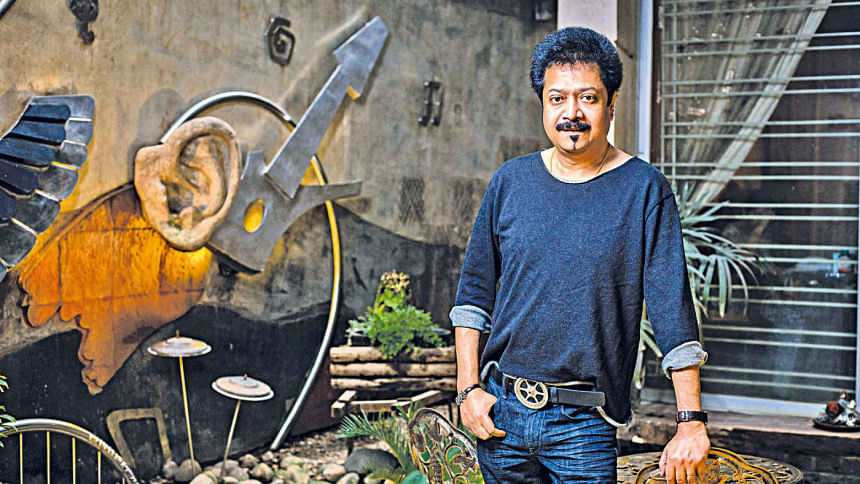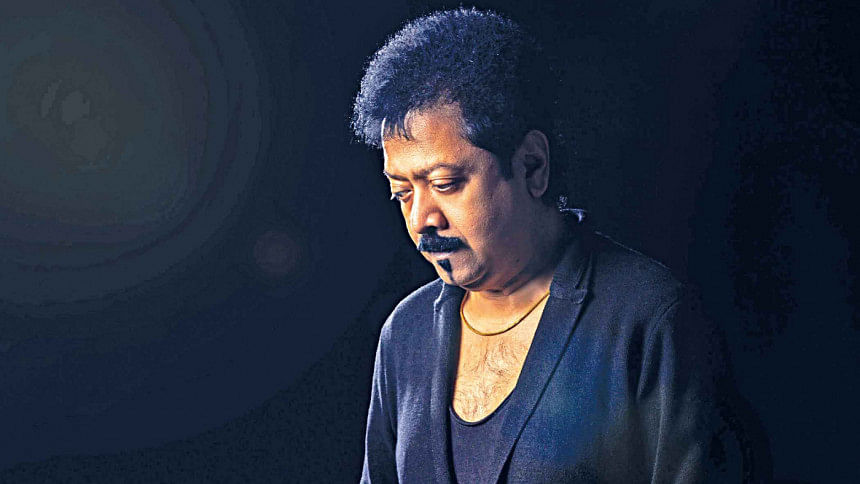DEVOTEE OF MUSIC

Rafi Hossain: Welcome to Uncensored with Rafi Hossain. Today, we are joined by a special guest, Kumar Bishwajit. Thank you for joining us today.
Kumar Bishwajit: Thank you for having me, Rafi Bhai. I am very happy to be here.
Rafi: You recently made a song in tribute to Bangabandhu in celebration of his 100th birthday. What inspired you to do so?
Kumar: I consider myself very fortunate to have been able to witness the fight for the freedom of Bangladesh. I was not old enough to fight for liberation, but I was old enough to understand what was going on. I was around seven or eight years old, and I had seen a lot of the war. With us reaching the fiftieth anniversary of our independence, I felt that I should also celebrate the man who led us to that independence. I'm blessed to sing about Bangabandhu. We are all grateful to him for what he has done for us. Without his contributions, we would not be able to call ourselves Bangladeshi. The song that I made about him was amazing. Gazi Mazharul Anwar did an amazing job writing it. He told me that he actually wrote it as a poem after the liberation of our country, and he even recited it to Bangabandhu. The tune for the song was given by Kishore Das, and Manam Ahmed composed it. The mixing and mastering were done in Bombay. We made the song in celebration of his birthday.
Rafi: You did this song from your own initiative, right?
Kumar: I did it all because of my love for Bangabandhu. I admire him so much and I wanted to make a song in tribute to the man who carried us to freedom.
Rafi: Do you know if our honorable Prime Minister heard the song yet?
Kumar: I asked for her permission before making the song, and she told me to make it. She has heard it, and once the pandemic is over, I will present her with a box which has the CD and pen drive with the song on it. It is a wooden box with a picture of Bangabandhu on it. I am eager to present it to her.
Rafi: Even after so long, how have you kept yourself in such good shape? It seems like you do not age. What is your secret?
Kumar: I am a bit worried about that. Maybe it is because of all the formalin that is mixed in everything nowadays. (laughs). Honestly, I do not try too hard to take care of my appearance as I am more focused on conveying myself through my music. I think that when it comes to music, looks do not matter.
Rafi: When you were young, did you decide that you would pursue music as a career?
Kumar: I think that to be a musician, you must be born with a God-gifted talent. There are a lot of people in the world who are very interested to be musicians, but without that gift, it is very difficult to actually make it. Without the help of God, I would not have been able to come this far. I grew up in a very musical atmosphere, and in my family, singing or listening to music was always encouraged. That made me fall in love with music. When a teacher would come to teach my sisters music, I would stand close enough to hear, and try to pick up the songs that he was teaching. After he would leave, I would sing the songs, and it would shock my sisters, as I had managed to pick it up by just hearing it. I was very young then, so the adults in my family thought I was too young to start learning music. Seeing how I was picking up songs easily, my grandfather decided that I should start learning with a teacher. And once I had a teacher, I was picking up almost four songs a day. Where I lived, the teachers did not have too many songs to teach, and within a few months, I picked up every song my teacher had. At one point, my teacher stopped coming and when my grandfather asked why, the teacher told him that to teach me, he has to go back and learn songs again. Soon, I was enlisted to sing on the radio, and I even recorded a few songs then. Those songs eventually made to my first album. I then recorded some songs at a studio where the producer of BTV then, Al Mansur, came. After hearing my song, he asked me to sing on a programme. After that, I started receiving attention, and then I made my first album.

Rafi: You used to perform with the band, 'Souls', right?
Kumar: I was not a member of the band, but sometimes, I would play their keyboard if Nakib Bhai was not there. I was more of an invited guest. I had my own band back then, Feelings. Ayub Bachchu was in the band, and before we made Feelings, Bachchu and I were together in a band called Rhythm-77. After I left Feelings, the band broke up and then James started a new band under the same name.
Rafi: You were very close to Ayub Bachchu. What do you think of him as a musician?
Kumar: I have known Bachchu for a long time. We grew up in the same locality and were always very close. I made him join Feelings, and he also played using my guitar for a while. We both had very strict families that were not very eager to let us pursue music as a career, so we were both very close. Even when we moved to Dhaka after forming the band, we lived in the same house. As a musician, he was very dedicated. He would listen to a lot of music and try to pick it up. We would listen to popular instrumentals, and we would pick them up and cover them. Bachchu would always practise until he got it perfect. He had a dream, and he turned it into a reality. I think his contributions to music are proof of his love and dedication to music. Someone like Ayub Bachchu is very rare, and we do not know when someone of his calibre will appear again.
Rafi: Are you hopeful for the future of the industry?
Kumar: I think that there will be good artists coming out, but to be good artists, the artists need to have passion and dedication. If they do it just for money and fame, they will not be able to make good music. When I started, I had to struggle, and at the end, with my dedication to music, all the struggle proved to be worth it. Now, I am proud to say that I have been working with music for almost thirty-eight years, and it is my main profession. But, it was not an easy road to be a musician. To actually make it in music, you need to make sure the songs you create are of top quality. Doing covers of songs is fine, but without original content. it is impossible to be a professional musician. If you make good songs, it will reach people. Another important thing an artist needs to remember is that they must make songs which people will remember and something that they can sing onstage with people singing along. If you have a thousand songs but people only remember four, something is not right. It is much better to have only two songs, but people completely remember both. To make songs, you have to make things you enjoy yourself.
Rafi: Do you have any message for the readers?
Kumar: I hope everyone will stay well, healthy and safe, and work to better themselves this new year.

 For all latest news, follow The Daily Star's Google News channel.
For all latest news, follow The Daily Star's Google News channel. 



Comments